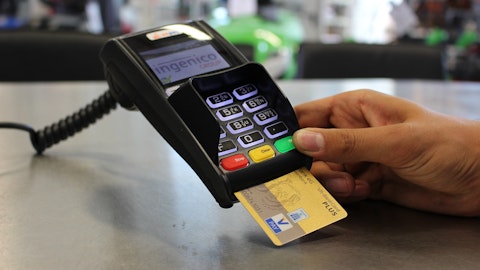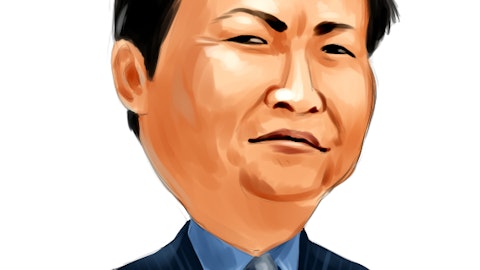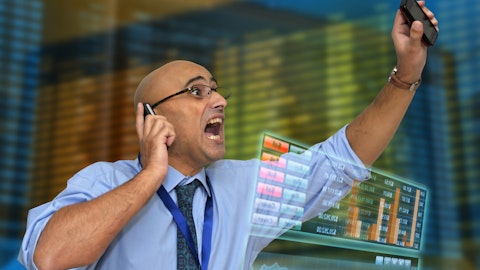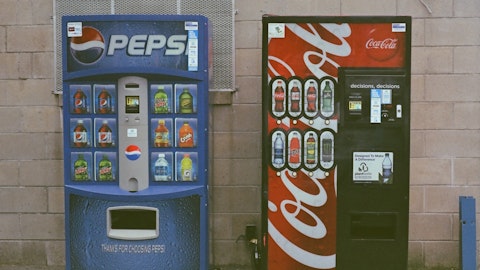In this article, we discuss 5 dividend stocks to buy now before recession begins. If you want to read our detailed discussion on analysts’ views about the recession, go directly to read 10 Dividend Stocks to Buy Now Before Recession Begins.
5. The Procter & Gamble Company (NYSE:PG)
Dividend Yield as of August 3: 2.57%
The Procter & Gamble Company (NYSE:PG) is a consumer goods company that sells products that are useful in everyday life. The company announced its fiscal Q4 2022 results in July, generating an operating cash flow of over $16.7 billion with an adjusted free cash flow productivity of 93%. Moreover, it also returned $19 billion to shareholders in FY22, $8.8 billion of which was paid in dividends. At the end of Q4, The Procter & Gamble Company (NYSE:PG) had over $7.2 billion available in cash, while its total assets amounted to over $117.2 billion.
The Procter & Gamble Company (NYSE:PG) holds one of the longest track records of consistent dividend growth, boosting its dividends for the past 66 years. It pays a quarterly dividend of $0.9133 per share, with a yield of 2.57%, as of August 3.
Following the company’s fiscal Q4 2022 results, Barclays set a $154 price target on The Procter & Gamble Company (NYSE:PG) while maintaining an Overweight rating on the shares.
The Procter & Gamble Company (NYSE:PG) experienced an increased hedge fund interest in Q1 2022, as 72 funds in Insider Monkey’s database owned stakes in the company, up from 67 a quarter earlier. These stakes are collectively valued at over $6 billion. With roughly 10 million shares, GQG Partners was the company’s leading shareholder.
4. PepsiCo, Inc. (NASDAQ:PEP)
Dividend Yield as of August 3: 2.62%
PepsiCo, Inc. (NASDAQ:PEP) is one of the world’s largest beverage companies. It deals in the manufacturing, distribution, and marketing of its products. Since the beginning of the year, the stock is up 1.45% while it delivered a return of 12.01% in the last year, as of the close of August 2.
In Q2 2022, PepsiCo, Inc. (NASDAQ:PEP) reported an operating cash flow of over $2 billion. The company generated over $1 billion in free cash flow, up from $696 million in the previous quarter. Dividend payments accounted for $2.9 billion of its shareholder returns during the quarter. PepsiCo, Inc. (NASDAQ:PEP) has been steadily raising its dividends for the past 49 years. The company pays a quarterly dividend of $1.15 per share. The stock’s dividend yield was recorded at 2.62% on August 3.
In August, Morgan Stanley raised its price target on PepsiCo, Inc. (NASDAQ:PEP) to $198 with an Overweight rating on the shares, highlighting the company’s distribution agreement with Celsius.
At the end of Q1 2022, 62 hedge funds tracked by Insider Monkey held stakes in PepsiCo, Inc. (NASDAQ:PEP), up from 60 in the previous quarter. These stakes hold a collective value of over $4.8 billion.
ClearBridge Investments mentioned PepsiCo, Inc. (NASDAQ:PEP) in its Q4, 2021 investor letter. Here is what the firm said:
“The pandemic created opportunities for us to be more aggressive in a variety of areas of the market. We were opportunistic throughout the year. After a strong year for equities, we sought to bolster more defensive areas of the portfolio and added to PepsiCo, increasing our exposure to a high-quality and stable name.”
3. Bristol-Myers Squibb Company (NYSE:BMY)
Dividend Yield as of August 3: 2.95%
Bristol-Myers Squibb Company (NYSE:BMY) is a New York-based multinational pharmaceutical company that delivers medicines to patients with serious conditions. The company performed really well during the pandemic as drug sales grew during that time period. Since the start of 2022, the stock has gained 18.4% and delivered a 5.7% return to shareholders in the past year, as of the market close of August 2.
Bristol-Myers Squibb Company (NYSE:BMY) reported solid Q2 2022 earnings, ending the quarter with cash and cash equivalents of over $10.7 billion. The company’s operating cash flow stood at over $2.2 billion and it generated nearly $2 billion in free cash flow during the quarter. Bristol-Myers Squibb Company (NYSE:BMY) raised its dividend for the 16th consecutive year in December 2021 and currently pays a quarterly dividend of $0.54 per share. It has a safe payout ratio of 70%. As of August 3, the stock’s dividend yield stood at 2.95%.
Appreciating the company’s latest quarterly earnings, JPMorgan raised its price target on Bristol-Myers Squibb Company (NYSE:BMY) in July to $85 and kept an Overweight rating on the shares.
At the end of Q1 2022, 70 hedge funds in Insider Monkey’s database held stakes in Bristol-Myers Squibb Company (NYSE:BMY), up from 66 in the previous quarter. These stakes are valued at over $2.4 billion.
Carillon Tower Advisers mentioned Bristol-Myers Squibb Company (NYSE:BMY) in its Q1 2022 investor letter. Here is what the firm has to say:
“Stock selection contributed the most while sector allocation was also positive. An underweight to communication services and an overweight to energy helped performance, while an underweight to consumer staples and an overweight to materials detracted. Stock selection was strong within healthcare and materials but was weak within information technology and industrials. Bristol-Myers Squibb (NYSE:BMY), the biopharmaceutical company, entered into accelerated share repurchase agreements.”
2. JPMorgan Chase & Co. (NYSE:JPM)
Dividend Yield as of August 3: 3.56%
An American multinational investment bank, JPMorgan Chase & Co. (NYSE:JPM) holds a strong 12-year track record of consistent dividend growth. In the past five years, the company boosted its dividend at a CAGR of 15%. During Q2 2022, the company paid nearly $3 billion in dividends, up from $1.7 billion paid in the previous quarter. JPMorgan Chase & Co. (NYSE:JPM) pays a quarterly dividend of $1 per share, with a dividend yield of 3.56%, as of August 3.
In July, RBC Capital expressed concerns about difficult capital market businesses and set a $130 price target on JPMorgan Chase & Co. (NYSE:JPM) with an Outperform rating on the shares.
At the end of Q1 2022, 110 hedge funds tracked by Insider Monkey owned stakes in JPMorgan Chase & Co. (NYSE:JPM), up from 107 in the previous quarter. The collective value of these stakes is over $5 billion. With over 7.7 million shares, Fisher Asset Management was the company’s leading stakeholder in Q1.
Carillon Tower Advisers mentioned JPMorgan Chase & Co. (NYSE:JPM) in its Q1 2022 investor letter. Here is what the firm has to say:
“More cyclical sectors, including technology and consumer discretionary, were among the weakest, likely due to rising interest rates and inflation. It was encouraging to see the quarter finish on a strong note with the S&P 500 only about 5% away from its all-time highs. Shares of JPMorgan Chase (NYSE:JPM) detracted from performance due to the company’s increased expense guidance, announced in January.”
1. Philip Morris International Inc. (NYSE:PM)
Dividend Yield as of August 3: 5.07%
Philip Morris International Inc. (NYSE:PM), a multinational tobacco company, reported over $5 billion in cash and cash equivalents at the end of Q2 2022, up from $4.5 billion in the previous quarter. The company’s total assets amounted to nearly $41 billion, in line with the previous quarter.
Philip Morris International Inc. (NYSE:PM) has been raising its dividends consistently for the past 14 years. It pays a quarterly dividend of $1.25 per share and has a yield of 5.07%, as of August 3. The company improved its payout ratio to 85.6%, from 95.3% in 2021.
The number of hedge funds tracked by Insider Monkey owning stakes in Philip Morris International Inc. (NYSE:PM) grew to 55 in Q1 2022, from 47 in the previous quarter. The stakes held by these hedge funds have a total value of over $6.6 billion.
Fundsmith Equity mentioned Philip Morris International Inc. (NYSE:PM) in its recently-published Q2 2022 investor letter. Here is what the firm has to say:
“Philip Morris International meanwhile benefited from its low rating, the perceived defensive nature of tobacco and latterly an attractive looking agreement to purchase Swedish Match (NASDAQ:MTCH) to create the undoubted leader in smokeless tobacco products and nicotine pouches. Despite this outperformance, Philip Morris International still ended the quarter as our second most lowly-rated stock.”
You can also take a look at 10 Semiconductor Stocks Popular Among Elite Hedge Funds and 10 Stocks That Will Benefit from Record Breaking Temperatures





